高中英语从句讲解
高中英语名词性从句知识讲解以及练习题 附答案
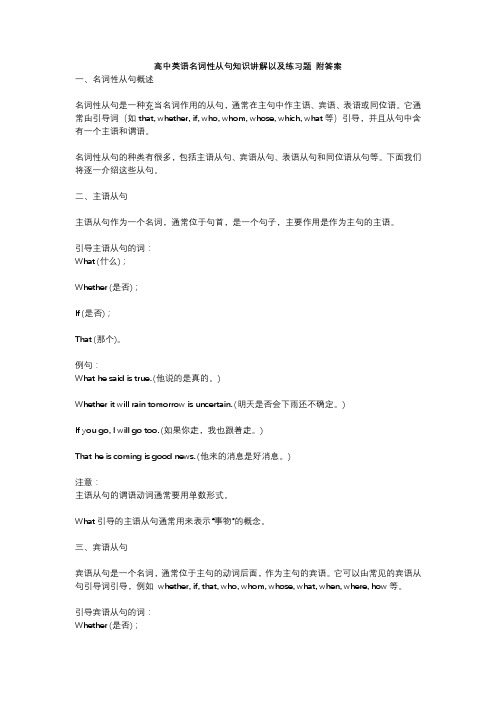
高中英语名词性从句知识讲解以及练习题附答案一、名词性从句概述名词性从句是一种充当名词作用的从句,通常在主句中作主语、宾语、表语或同位语。
它通常由引导词(如that, whether, if, who, whom, whose, which, what等)引导,并且从句中含有一个主语和谓语。
名词性从句的种类有很多,包括主语从句、宾语从句、表语从句和同位语从句等。
下面我们将逐一介绍这些从句。
二、主语从句主语从句作为一个名词,通常位于句首,是一个句子,主要作用是作为主句的主语。
引导主语从句的词:What (什么);Whether (是否);If (是否);That (那个)。
例句:What he said is true. (他说的是真的。
)Whether it will rain tomorrow is uncertain. (明天是否会下雨还不确定。
)If you go, I will go too. (如果你走,我也跟着走。
)That he is coming is good news. (他来的消息是好消息。
)注意:主语从句的谓语动词通常要用单数形式。
What引导的主语从句通常用来表示“事物”的概念。
三、宾语从句宾语从句是一个名词,通常位于主句的动词后面,作为主句的宾语。
它可以由常见的宾语从句引导词引导,例如whether, if, that, who, whom, whose, what, when, where, how等。
引导宾语从句的词:Whether (是否);If (是否);That (那个);Who (谁);Whom (谁);Whose (谁的);What (什么);When (何时);Where (何处);How (如何)。
例句:I know that he is coming. (我知道他要来。
)I wonder if he is telling the truth. (我想知道他是否说了真话。
高中英语语法名词性从句专题讲解

高中英语语法名词性从句专题讲解一、that 从句1、主语从句(1)that从句作主语时,常用it作形式主语,常见的句型有:It+be+形容词(obvious, true, natural,surprising,good,wonderful,funny,possible,likely,certain,prob able,etc.)+that从句It+be+名词词组(no wonder, an honor, a good thing, a pity, no surprise, etc.)+that从句It+be+过去分词(said, reported, thought, expected, decided, announced, arranged, etc.)+that从句(2)that可以省略,但that从句位于句首时,that不能省略。
2、宾语从句(1)常见的可以接that从句作宾语的动词有see, say, know, imagine, discover, believe, tell, show, think, consider, be sure, be afraid等。
在可以接复合宾语的动词之后,如think, make, consider等,可以用it作形式宾语。
(2)That从句一般不能充当介词宾语,偶尔可作except, in 的宾语。
3、表语从句(that不可省略)4、同位语从句连词that引导同位语从句时,应在某些抽象名词之后,如:fact, hope, desire, thought, suggestion, idea, news, problem, possibility等,对前面的名词起补充说明的作用,that在从句中不担当任何成分,不能省略。
二、whether/if从句1、在表语从句和同位语从句中只能用whether不能用if;当主语从句放于句首时,只能用whether不用if;当it作形式主语,主语从句放在句末时用whether或if均可;discuss后引导宾语从句时,必须用whether。
高中英语从句分析(完整版)
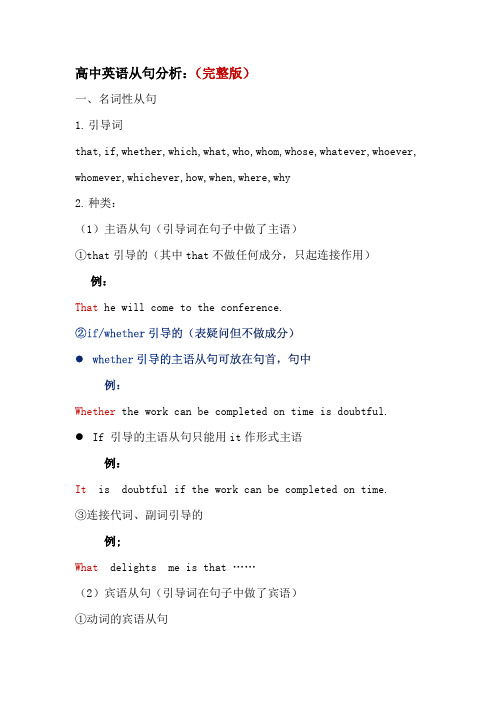
高中英语从句分析:(完整版)一、名词性从句1.引导词that,if,whether,which,what,who,whom,whose,whatever,whoever, whomever,whichever,how,when,where,why2.种类:(1)主语从句(引导词在句子中做了主语)①that引导的(其中that不做任何成分,只起连接作用)例:That he will come to the conference.Whether the work can be completed on time is doubtful.If 引导的主语从句只能用it作形式主语例:It is doubtful if the work can be completed on time.③连接代词、副词引导的例;What delights me is that ……(2)宾语从句(引导词在句子中做了宾语)①动词的宾语从句例:He told us (that) they would help us.②介词的宾语从句(后不跟that,跟wh-类连接词)例:Kate was interested in what she has seen at the park.③形容词的宾语从句(表情感的)例:I am not sure whether they will agree with us.(3)表语从句①Be动词之后的为表语从句例:This is what i am interested in.②注意:●主语名词为reason时,表语的引导词为that不用why和because。
●主句主语为advice,suggestion,order等,表语中的谓语动词用should +动词原形。
(4)同位语从句(引导词是名词,如fact等)①这个从句是用来解释,说明某一名词的内容和实质的。
例:The fact that counties are still suffering poverty is a big problem to the world.二.定语从句1.修饰主句中的某一名词或代词的句子。
高考英语 高中英语三大从句知识点 附例句
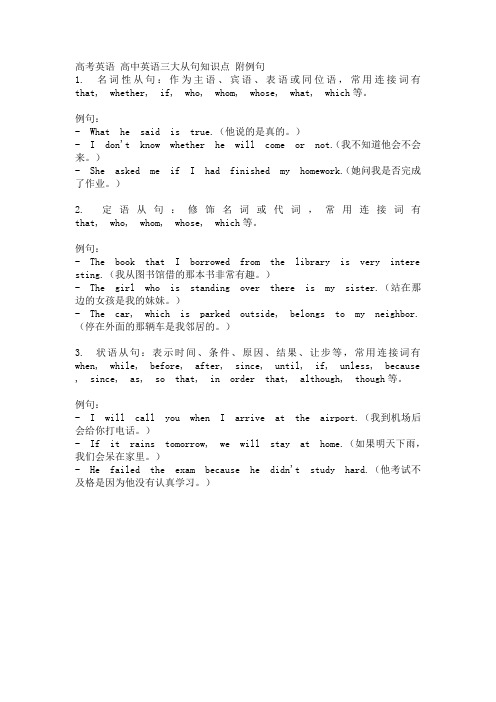
高考英语高中英语三大从句知识点附例句1. 名词性从句:作为主语、宾语、表语或同位语,常用连接词有that, whether, if, who, whom, whose, what, which等。
例句:- What he said is true.(他说的是真的。
)- I don't know whether he will come or not.(我不知道他会不会来。
)- She asked me if I had finished my homework.(她问我是否完成了作业。
)2. 定语从句:修饰名词或代词,常用连接词有that, who, whom, whose, which等。
例句:- The book that I borrowed from the library is very intere sting.(我从图书馆借的那本书非常有趣。
)- The girl who is standing over there is my sister.(站在那边的女孩是我的妹妹。
)- The car, which is parked outside, belongs to my neighbor.(停在外面的那辆车是我邻居的。
)3. 状语从句:表示时间、条件、原因、结果、让步等,常用连接词有when, while, before, after, since, until, if, unless, because , since, as, so that, in order that, although, though等。
例句:- I will call you when I arrive at the airport.(我到机场后会给你打电话。
)- If it rains tomorrow, we will stay at home.(如果明天下雨,我们会呆在家里。
)- He failed the exam because he didn't study hard.(他考试不及格是因为他没有认真学习。
高中英语知识点归纳从句的分类与用法
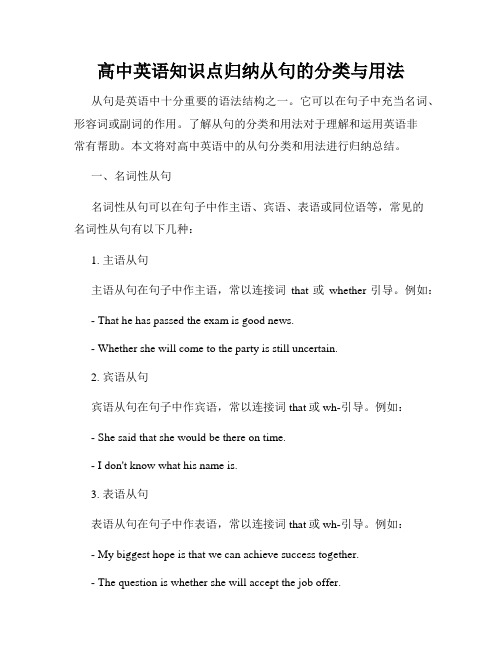
高中英语知识点归纳从句的分类与用法从句是英语中十分重要的语法结构之一。
它可以在句子中充当名词、形容词或副词的作用。
了解从句的分类和用法对于理解和运用英语非常有帮助。
本文将对高中英语中的从句分类和用法进行归纳总结。
一、名词性从句名词性从句可以在句子中作主语、宾语、表语或同位语等,常见的名词性从句有以下几种:1. 主语从句主语从句在句子中作主语,常以连接词that或whether引导。
例如:- That he has passed the exam is good news.- Whether she will come to the party is still uncertain.2. 宾语从句宾语从句在句子中作宾语,常以连接词that或wh-引导。
例如:- She said that she would be there on time.- I don't know what his name is.3. 表语从句表语从句在句子中作表语,常以连接词that或wh-引导。
例如:- My biggest hope is that we can achieve success together.- The question is whether she will accept the job offer.同位语从句用来对某个名词或代词进行解释或说明,常以连接词that引导。
例如:- The fact that he broke his promise disappointed me.- Her announcement that she was going to retire surprised everyone.二、形容词从句形容词从句用来修饰名词或代词,常以连接词that, which, who, whom, whose, when, where, why等引导。
例如:- The book that I borrowed from the library is very interesting.- I know a girl whose father is a famous actor.三、副词从句副词从句用来修饰动词、形容词或副词,常以连接词that, if, whether, because, although, when, where, how等引导。
高中英语主要要掌握三大从句
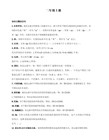
关系代词所代替的先行词是人或物的名词或代词,并在从句中充当主语、宾语、定语等成分。关系代词在定语从句中作主词保持一致。
(1), who, whom, that
这些词代替指人,“whom”作宾语指人,“that”既可作主语又可作宾语(作宾语可以省略),可以指人也可以指物。
引导名词性从句的连接词可分为三类:
1、连词(5个):that (宾语从句或表语从句中that有时可以省略) whether,if (均表示“是否”表明从句内容的不确定性)
as if ,as t
2、连接代词(9个):what, whatever, who, whoever, whom, whomever, whose, which, whichever
高中英语主要要掌握三大从句。
分别是:
1、定语从句(形容词从句)
2、名词词从句(包括主语从句,宾语从句,表语从句,同位语从句)
3、状语从句(副词性从句,包括时间,地点,结果,目的,原因等)
一、定语从句:
定语从句(Attributive Clauses)在句中做定语,修饰一个名词或代词,被修饰的名词,词组或代词即先行词。定语从句通常出现在先行词之后,由关系词(关系代词或关系副词)引出。
(3),关系副词where主要用于修饰表示地点的名词,同时它在定语从句中用作地点状语。
3、非限制性定语从句
它起补充说明作用,缺少也不会影响全句的理解。在非限制性定语从句的前面往往有逗号隔开。
二、名词性从句
在句子中起名词作用的句子叫名词性从句 (Noun Clauses)。 名词性从句的功能相当于名词词组, 它在复合句中能担任主语、宾语、表语、同位语、介词宾语等,因此根据它在句中不同的语法功能,名词性从句又可分别称为主语从句、宾语从句、表语从句和同位语从句。
高中英语2024届高考名词性从句知识分类讲解(主语从句+宾语从句+表语从句+同位语从句)
高考英语名词性从句知识讲解名词性从句是指在复合句中起名词作用的句子,功能相当于名词词组。
名词性从句在复合句中能作主语、宾语、表语、同位语等,根据在句中的语法功能可分为主语从句、宾语从句、表语从句和同位语从句。
一、主语从句【定义】在复合句中,作主语的句子称为主语从句。
常见的连接词:(连接词在句中不能省略)that, whether, who, what, whatever, whoever, where, when, why, how等。
【用法】1.连接词 that 引导That we should learn English well is very important.主语从句中 we should learn English well句子完整,不缺成分,用that引导,that 不能省连接词whether,if 引导whether 引导的主语从句可放句首,也可放句中,表“是否”if 引导的主语从句只能引导动词后的宾语Whether I will go or not depend on the weather.It remains to be seen whether / if they can finish the task in time.2.连接代词what, who, which, whose, whatever, whichever,whoever等引导What matters most is your attitude.3.连接副词when,where,why,how等引导How he made it is still unknown.4.it作形式主语为了避免句子头重脚轻,通常把形式主语it放在句首,真正的主语放在句子后面。
常见句型:(1) It is + n.+ that + 句子It is +(a pity / a shame / a fact …)+ that ...(2) It is + adj.+ that + 句子It is +(true / clear / important …)+ that ...(3) It is + 过去分词 + that + 句子It is+ said / announced / expected / believed / hoped… + that ...(4) It seems /appears / happens / turned out that + 句子(5) It hit sb./occurred to sb.that + 句子二、宾语从句【定义】在复合句中,作宾语的句子称为宾语从句。
高中英语语法:四种名词性从句讲解与练习
名词性从句名词性从句相当于名词,可分别作主句的主语、表语、宾语和同位语。
因此,名词性从句可分为主语从句、表语从句、宾语从句和同位从句。
引导词:主语从句就是在复合句中用作主语的从句,引导主语从句的引导词主要有三类:一是that;二是whether;三是那些可以用作疑问词的词语,如what, who, which, when, where, how, why等(一)引导名词性从句的连接词1、连接代词:who, whose, whom, what, which。
有词义,在从句中担任成分,如主语、表语、宾语、或定语等。
2、连接副词:when, where, why, how。
有词义,在从句中担任成分,作状语。
3、连接词:that, whether, if, as if。
that 无词义,在从句中不担任成分,有时可省略;if (whether), as if虽有词义,但在从句中不担任成分。
注意:连接代词与连接副词在句中不再是疑问句,因而从句中谓语不用疑问式。
连接代词与连接副词在从句充当句子成分,连接词whether 和if(是否),as if(好象)在从句中不充当句子成分,只起连接作用。
根据句义,如果连接代词与连接副词,whether、if 和as if都用不上时,才用that作连接词(that本身无任何含义)。
一、主语从句与宾词从句连词、语序、时态相同。
只是不能用if, that 不可省;(一)、主语从句是一个句子,在句子中作主语成分。
(二),主语从句的特点1.与宾语从句使用同样的连接词,只是if 不能用;1)、陈述句用that。
2)、一般疑问句用whether。
3)、特殊疑问句用特殊疑问词what, which, who,when, where, why, how 等词引导。
2.经常隐身(以it为形式主语出现)。
例句:1.It's true that the earth is round.That the earth is round is true.2. 表是否的意思时,不能用if代替whether.It hasn't been decided whether he'll come or not.Whether he'll come or not hasn't been decided.3. 从句语序为主谓宾正常语序。
高中英语状语从句用法详解
高中英语状语从句用法详解内容提要:一、时间状语从句二、地点状语从句三、方式状语从句四、水平状语从句五、缘由状语从句六、结果状语从句七、目的状语从句八、条件状语从句九、退让状语从句十、比拟状语从句一、时间状语从句:1、时间状语从句通常用以下附属连词来引导:after, before, as, once, till, until, (ever) since, when, whenever, while, now (that), as long as, as soon as。
如:Now (that)you’ve grown up, you must stop this childish behaviour. Whenever we met with difficulties, they came to help us.Come and see us whenever you have time.People do not know the value of health till they lose it.2、有些词,如immediately, directly, instantly 等,当用于as soon as 意义时,也可以引导时间状语从句,如:I got in touch with him immediately I received his letter.My sister came directly she got my message.The machine will start instantly you press the button.I’ll telephone you directly I hear the news.Will you look for it immediately you get there?3.某些表示时间的名词词组,如the (very) moment ( = as soon as ), the minute ( = as soon as ), the instant ( = as soon as ), the day, the year, the morning, every time, each time, next time, the first time 等,也可以引导时间状语从句,如:I’ll tell you about it the moment you come.I started the instant I heard the report.The instant she saw him she knew he was her brother.Every time I catch a cold, I have pain in my back.I’m going to see him next time he comes to Shenzhen.He left Europe the year World WarⅡbroke out.He had impressed me that way the first time I met him.I started the very moment I got your letter.I’ll tell him the minute (that) he gets here.4.有些关联附属连词,如no sooner …than / hardly …when / scarcely …when / barely …when 等,也能引导时间状语从句。
高中英语语法---名词性从句详解
名词性从句详解名词性从句包括主语从句、表语从句、宾语从句、同位语从句。
其关联词有连接词that,if,whether;疑问代词who,what,which和疑问副词when,where,how,why等。
一.语法讲解1.主语从句主语从句在句中做主语。
它可以放在主句谓语动词之前,但多数情况由it作形式主语,而把主语从句放在主句之后。
例如:Who did that is known to all.It is interesting that you should like him.2.表语从句表语从句在句中作表语,位于主句中的系动词之后。
如:The question is who can complete the difficult task.表语从句不能用if引导,但可用as if引导。
例如:He looked as if he was going to cry.3.同位语从句同位语从句跟在名词后面,进一步说明该名词的具体内容。
引导同位语从句的名词主要有fact,news,promise,idea,truth等。
连接词用that(不用which),及连接副词how,when,where,why等。
例如:His delay is due to the fact that the car went wrong halfway.The news that our team has won the match is true.She asked the reason why there was a delay.4.宾语从句1.宾语从句在句中作及物动词或介词的宾语。
例如:We can learn what we did not know.He will talk to us about what he saw in the U.S.如果主句的谓语动词是及物动词make,find,see,hear等,则把宾语从句置于宾语补足语之后,用it作为形式宾语。
- 1、下载文档前请自行甄别文档内容的完整性,平台不提供额外的编辑、内容补充、找答案等附加服务。
- 2、"仅部分预览"的文档,不可在线预览部分如存在完整性等问题,可反馈申请退款(可完整预览的文档不适用该条件!)。
- 3、如文档侵犯您的权益,请联系客服反馈,我们会尽快为您处理(人工客服工作时间:9:00-18:30)。
定语从句及相关术语1.定语从句:定语从句是由关系代词或关系副词引导的从句,其作用是作定语修饰主句的某个名词性成分,相当于形容词,所以又称为形容词性从句,一般紧跟在它所修饰的先行词后面。
2.关系词:引导定语从句的关联词称为关系词,关系词有关系代词和关系副词。
关系代词有that, which, who, whom, whose, as等;关系副词有where, when, why等。
关系词常有3个作用:1,引导定语从句。
2,代替先行词。
3,在定语从句中担当一个成分。
注:关系代词有主语.宾语之分。
一般whom作为宾语。
4.定语:定语用来限定、修饰名词或代词的,是对名词或代词起修饰、限定作用的词、短语或句子,汉语中常用‘……的’表示。
主要由形容词担任。
此外,名词,代词,数词,分词,副词,不定式以及介词短语也可以来担任,也可以由一个句子来担任.单词作定语时通常放在它所修饰的词之前,作前置定语。
短语和从句作定语时则放在所修饰的词之后,作后置定语。
(一)限定性定语从句一、关系代词(在句中作主语、宾语或定语)1. that既可代表事物也可代表人,which代表事物;它们在从句中作主语或宾语,that在从句中作宾语时常可省略关系词,whi ch在从句中作宾语也可以省略。
[eg:this is the book (which)you want。
]而且,如果which在从句中作“不及物动词+介词”的介词的宾语,注意介词不要丢掉,而且介词总是放在关系代词w hich的前边,但有的则放在它原来的位置2. which作宾语时,根据先行词与定语从句之间的语义关系,先行词与which之间的介词不能丢3. 代表物时多用which,但在带有下列词的句子中用that而不用which,这些词包括当先行词是anything, everything, nothi ng , none等不定代词时,或者是由every, any, all, some, no, little, few, much等修饰时等,这时的that常被省略还有先行词前有序数词或形容词最高级修饰时,或先行词就是序数词或最高级时.以及先行词中既有人又有物时.还有句中前面有which时,都只能用that4.who和whom引导的从句用来修饰人,分别作从句中的主语和宾语,whom作宾语时,要注意它可以作动词的宾语也可以作介词的宾语5.whose是关系代词,修饰名词作定语,相当于所修饰成分的前置所有格.它引导的从句可以修饰人和物, 当它引导的从句修饰物体时, 可以与of which 调换,表达的意思一样。
二、关系副词(在句中作状语)关系副词=介词+关系代词why=for whichwhere=in/ at/ on/ ... which (介词同先行词搭配)when=during/ on/ in/ ... which (介词同先行词搭配)1. where是关系副词,用来表示地点的定语从句。
2. when引导定语从句表示时间[注]值得一提的是,表示时间“time"一词的定语从句只用when引导,有时不用任何关系代词,当然也不用that引导。
By the time you arrive in London, we will have stayedthere for two weeks. I still remember the first time I met h er. Each time he goes to business trip, he brings a lot of li ving necessities, such as towels, soap, toothbrush etc。
3. 当从句的逻辑主语是some, any, no, somebody, anybod y, nobody, something, anything, everything或nothing时,常用there is来引导There is somebody here who wants to speak to you. 这里有人要和你说话。
(二)非限定性定语从句非限定性定语从句的作用是对所修饰的成分作进一步说明,通常是引导词和先行词之间用逗号隔开,将从句拿掉后其他部分仍可成立1. which引导的非限定性定语从句来说明前面整个句子的情况或主句的某一部分2.当先行词是专有名词或物主代词和指示代词所修饰时,其后的定语从句通常是非限制性的,例如:Charles Smith, who was my former teacher, retired last y ear. 查理·史密斯去年退休了,他曾经是我的老师。
My house, which I bought last year, has got a lovely gar den.我去年买的的那幢房子带着个漂亮的花园。
This novel, which I have read three times, is very touchi ng. 这本小说很动人,我已经读了三遍。
3.非限制性定语从句还能将整个主句作为先行词, 对其进行修饰, 这时从句谓语动词要用第三人称单数,例如:He seems not to have grasped what I meant, which grea tly upsets me. 他似乎没抓住我的意思,这使我心烦。
Liquid water changes to vapor, which is called evaporatio n. 液态水变为蒸汽,这就叫做蒸发。
4. 有时as也可用作关系代词5. 在非限定性定语从句中,不能用关系副词why和关系代词that,而用who, whom代表人,用which,whose代表事物.;(三)关系代词引导的定语从句1.who指人在从句中做主语(1) The boys who are playing football are from Class One.(2) Yesterday I helped an old man who lost his way.2. whom指人,在定语从句中充当宾语,常可省略。
(注:who和whom已无太大区别,可以通用。
)(1) Mr. Liu is the person (whom) you talked about on t he bus.(2) Mr. Ling is just the boy whom I want to see.(3) The man who/whom you met just now is my friend.注意:关系代词whom在口语和非正式语体中常用who代替,可省略。
如果在从句中做宾语,就用whom或who.比如: He is the ma n whom/who I talk to.如果是在从句中作主语就只能用who.比如: He is the man who has an English book.3.which指物,在定语从句中做主语或者宾语,做宾语时可省略(1) Football is a game which is liked by most boys.(2) This is the pen (which) he bought yesterday.4. that指人时,相当于who或者whom;指物时,相当于which。
在定语从句中做主语或者宾语,做宾语时可省略。
(1) The number of the people that/who come to visit the city each year rises one million.(2) Where is the man that/whom I saw this morning? 5. whose通常指人,也可指物,在定语从句中做定语(1) He has a friend whose father is a doctor.(2) I once lived in a house whose roof has fallen in.wh ose指物时,常用以下结构来代替(3) The classroom whose door is broken will soon be r epaired.(4) The classroom the door of which is broken will soo n be repaired.(5) Do you like the book whose color is yellow?(6) Do you like the book the color of which is yellow?(四)注意介词+关系代词引导的定语从句关系代词在定语从句中做介词宾语时从句常由介词+关系代词引导(1) The school (that/which) he once studied in is very f amous.(2) The school in which he once studied is very famou s.(3) Tomorrow I will bring here a magazine (that/which) you asked for.(4) Tomorrow I will bring here a magazine for which yo u asked.(5) We’ll go to hear the famous singer (whom/that/who) we have often talked about.(6) We’ll go to hear the famous singer about whom we have often talked.注意:1. 含有介词的动词短语一般不拆开使用,如:look for, look after, take care of等(1) This is the watch which/that I am looking for. (T=正确)(2) This is the watch for which I am looking. (F=错误)2. 若介词放在关系代词前,关系代词指人时用whom,不可用who或者that;指物时用which,不能用that;关系代词是所有格时用whose(1) The man with whom you talked is my friend. (T)(2) The man with that you talked is my friend. (F)(3) The plane in which we flew to Canada is very comf ortable. (T)(4) The plane in that we flew in to Canada is very comfortable. (F)3. “介词+关系代词”前可有some, any, none, both, all, neither, most, each, few等代词或者数词(1) He loved his parents deeply, both of whom are very kind to him.(2) In the basket there are quite many apples, some of which have gone bad.(3) There are forty students in our class in all, most of whom are from big cities(五)关系副词引导的定语从句1. when指时间,在定语从句中做时间状语(1) I still remember the day when I first came to the s chool.(2) The time when we got together finally came.2. where指地点,在定语从句中做地点状语(1) Shanghai is the city where I was born.(2) The house where I lived ten years ago has been p ulled down.3. why指原因,在定语从句中做原因状语(1) Please tell me the reason why you missed the plane.(2) I don’t know the reason why he looks unhappy tod ay.注意:关系副词引导的从句可以由“介词+关系代词”引导的从句替换(1) The reason why/ for which he refused the invitation is not clear,(2) From the year when/in which he was going to scho ol he began to know what he wanted when he grew up.(3) Great changes have taken place in the city in which./whereI was born.(六)判断关系代词与关系副词方法一:用关系代词,还是关系副词完全取决于从句中的谓语动词。
